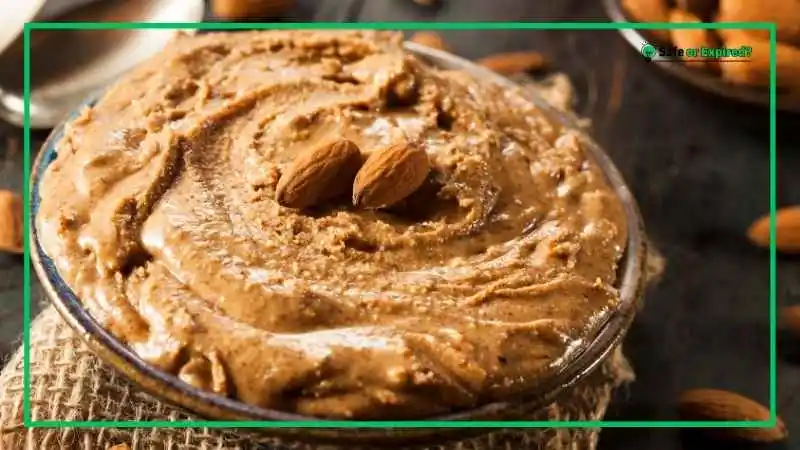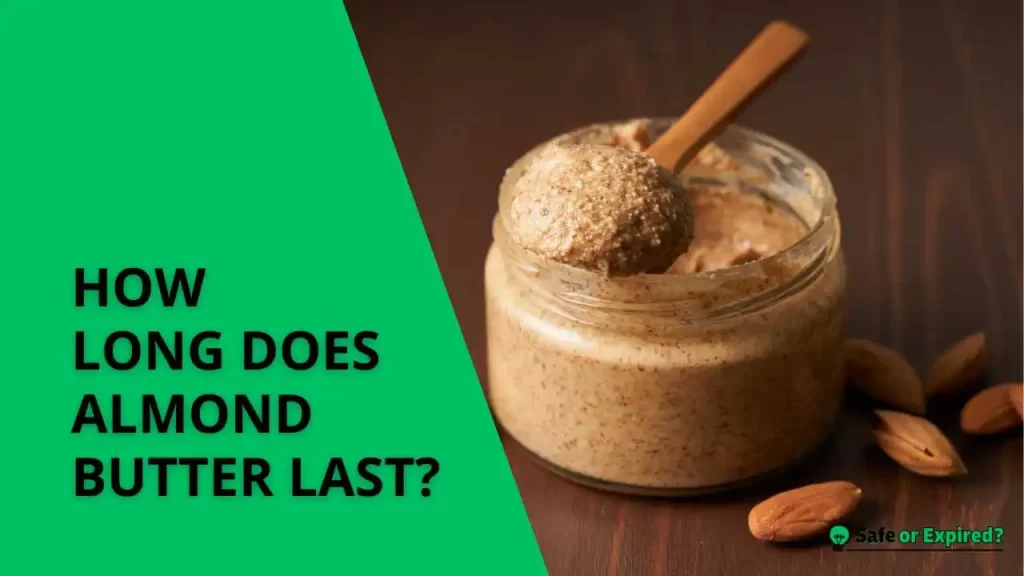“How long does almond butter last?” is a common question for those interested in healthy eating habits. Well, the short answer is that unopened almond butter can last up to 2 years, and once opened, it can stay fresh for 1 to 2 months in the pantry. But the good thing is knowing how to store almond butter properly can make all the difference.
Keep reading for tips on how to enjoy your almond butter at its best!
How Long Does Almond Butter Last?
Almond butter typically lasts for about 1 to 2 months after opening if stored in a cool, dry place. Unopened almond butter can last up to 2 years if kept in a pantry, but refrigeration can extend its shelf life.
You must always look for signs of spoilage to ensure the almond butter is still good to eat.
How Long Does Almond Butter Last Unopened?
Unopened almond butter can last up to 2 years when stored in a cool, dark pantry. The natural oils in the almond butter help preserve it, but refrigeration can further extend its shelf life, keeping it fresh for even longer.
How Long Does Almond Butter Last After Opening?

Once opened, almond butter typically lasts for 1 to 2 months if stored in a dry place. To extend its freshness, refrigerate it after opening, where it can last up to 6 to 7 months. Moreover, always check for changes in smell or texture as they are the indicators of spoilage.
How Long Does Almond Butter Last in the Refrigerator?
When stored in the refrigerator, almond butter can last up to 6 months. The cool temperature helps prevent the natural oils from becoming rancid and maintains the butter’s freshness. Always ensure the jar is tightly sealed to keep it fresh longer.
How Long Does Almond Butter Last Unrefrigerated?

Almond butter can last for about 1 to 2 months, unrefrigerated after opening, provided it is stored in a cool, dry place. However, to maximize its shelf life and maintain optimal freshness, it is recommended to refrigerate almond butter after opening.
How Long Does Homemade Almond Butter Last in the Fridge?
Homemade almond butter typically lasts up to 2 weeks in the refrigerator. Without the preservatives, homemade almond butter has a shorter shelf life. Store it in an airtight container and use a clean spoon each time. The reason? Well, to avoid contamination.
How Long Does Almond Butter Last in the Freezer?
Almond butter can last up to 1 year in the freezer. Freezing preserves its freshness and prevents the natural oils from going rancid. Store the almond butter in an airtight container/box or freezer-safe bag to maintain quality. Thaw it in the refrigerator before use for the best texture and taste.
How Long Does Almond Butter Last Past Expiration Date?
Almond butter can typically last for several months past its expiration date. However, it must be stored properly in a cool place and the jar is unopened. Once opened, it should be consumed within 3-4 months for best quality.
Always check for signs of spoilage, such as an off smell, before consuming almond butter that is past its expiration date.
Which Factors Affect the Shelf Life of Almond Butter?
The shelf life of almond butter is affected by factors such as storage conditions, whether it’s opened or unopened, the presence of preservatives, and whether it’s homemade or store-bought. Proper storage is key to keeping almond butter fresh and safe to eat.
Storage Conditions
Storage conditions are one of the most important factors affecting how long almond butter lasts. When almond butter is stored in a dry place, it stays fresh longer.
Keeping it in the pantry is fine for a few months, but for the best results, storing it in the refrigerator is ideal. The cold temperature slows down the process that makes the oils go bad, known as rancidity.
Always keep the lid tightly closed to keep out moisture and air, which can also make almond butter spoil faster. Clean utensils should be used every time to avoid introducing bacteria.
Opened vs. Unopened
Whether almond butter is opened or unopened greatly impacts its shelf life. Unopened almond butter can last up to 2 years if stored properly. This is because the seal keeps out air and moisture, which can cause spoilage.
Once you open the jar, the shelf life decreases because it’s exposed to air and possible contaminants. After opening, it’s best to refrigerate almond butter, where it can last for about 6 months.
Presence of Preservatives
Preservatives in almond butter help extend its shelf life. Many store-bought almond butters contain natural preservatives like salt or added oils, which help keep them fresh longer. These ingredients slow down the process of rancidity and bacterial growth.
However, homemade almond butter usually doesn’t have these preservatives, so it doesn’t last as long. It’s best to store homemade almond butter in the fridge and use it within two weeks to ensure it stays fresh.
Homemade vs. Store-Bought
Homemade almond butter and store-bought almond butter have different shelf lives. Store-bought versions often contain preservatives and are processed to last longer. They can stay good for up to 6 months in the fridge after opening.
On the other hand, homemade almond butter, which lacks preservatives, typically lasts about two weeks in the refrigerator.
How To Tell if Almond Butter Is Bad? Simple Signs
You can tell if almond butter is bad by checking for changes in smell, texture, and appearance. A sour or rancid smell, gritty or separated texture, and mold or dark spots indicate spoilage. You should always check these signs before eating.
Changes in Smell
One of the easiest ways to tell if almond butter has gone bad is by smelling it. Fresh almond butter has a pleasant, nutty aroma. If it smells sour, bitter, or just off, it’s likely spoiled. Rancid oils develop a distinct, unpleasant smell due to the breakdown of fats.
This sour smell is a clear sign that the almond butter is no longer safe to eat.
Changes in Texture
Texture changes are another sign that almond butter has gone bad. Fresh almond butter is usually smooth and creamy.

If it becomes overly gritty, hard, or has a significant separation of oils and solids that doesn’t mix back together easily, it might be spoiled.
Sometimes, a little oil separation is normal and can be stirred back in. But if the texture feels weird or unusual, it’s safer not to eat it. Always look for consistent texture when checking your almond butter.
Appearance of Mold or Dark Spots
Mold or dark spots are definite indicators that almond butter has spoiled. Mold can appear as fuzzy patches in various colors, like white, green, or black. Dark spots that weren’t there before can also signal spoilage.
If you see any mold or unusual discoloration, do not eat the almond butter. Even a small amount of mold means the entire jar is contaminated. It’s best to discard the whole jar if you notice any signs of mold or strange spots.
How Long Does Peanut Butter Last?
Unopened peanut butter can last up to 9-12 months past its printed expiration date. Once opened, it remains fresh for 2-3 months at room temperature and up to 6-9 months if refrigerated.
Natural peanut butter, which lacks preservatives, may separate and require stirring but follows similar guidelines: unopened, it lasts about six months, and opened, it should be consumed within three months or refrigerated for up to 6 months.
Always check for spoilage signs like rancid smell or mold before use.
How to Store Almond Butter for Maximum Freshness?
To keep almond butter fresh, store it in a cool, dry place if unopened. Once opened, refrigerate it to extend its shelf life. Always use a clean utensil (spoon) to avoid contamination and ensure the lid is tightly closed.
Store in a Cool, Dry Place
Storing almond butter in a dry place is essential for maintaining its freshness. Unopened almond butter jars can be kept in the pantry. Note that heat and light can cause the natural oils in almond butter to spoil faster.
A pantry or a cupboard that stays at a consistent temperature is ideal.
Refrigerate After Opening
After opening, it’s best to refrigerate almond butter to extend its shelf life. The cold temperature slows down the process of oils going rancid, keeping the almond butter fresh for a longer period.
Use Clean Utensils
Always use a clean utensil when scooping out almond butter. This simple habit helps prevent bacteria and other contaminants from entering the jar, which can cause spoilage. Avoid using fingers or previously used spoons, as they can introduce germs.
By using a clean spoon each time, you can keep your almond butter fresh and safe to eat for longer.
Keep the Lid Tightly Closed
Keeping the lid tightly closed on your almond butter jar is crucial for maintaining its freshness. A tightly sealed lid prevents air and moisture from getting in, which can cause the almond butter to spoil. After each use, ensure the lid is screwed on securely.
This helps to maintain the quality and extend the shelf life of your almond butter, whether it’s stored in the pantry or refrigerator.
As you explore the best ways to store almond butter, make sure you’re not falling for outdated advice. Check out this detailed guide that clears up common myths about food preservation.
Conclusion
In conclusion, knowing how long almond butter lasts can help you enjoy its delicious flavor longer. Here are the key points to remember:
- Unopened almond butter lasts up to 2 years when stored in a cool, dry place.
- Once opened, almond butter can last 1 to 2 months in the pantry or up to 6 months in the refrigerator.
- Check for spoilage, such as changes in smell, texture, and appearance.
- Store homemade almond butter in the fridge and consume it within two weeks.
With these tips, you can keep your almond butter fresh and tasty for as long as possible. Enjoy every spoonful!

